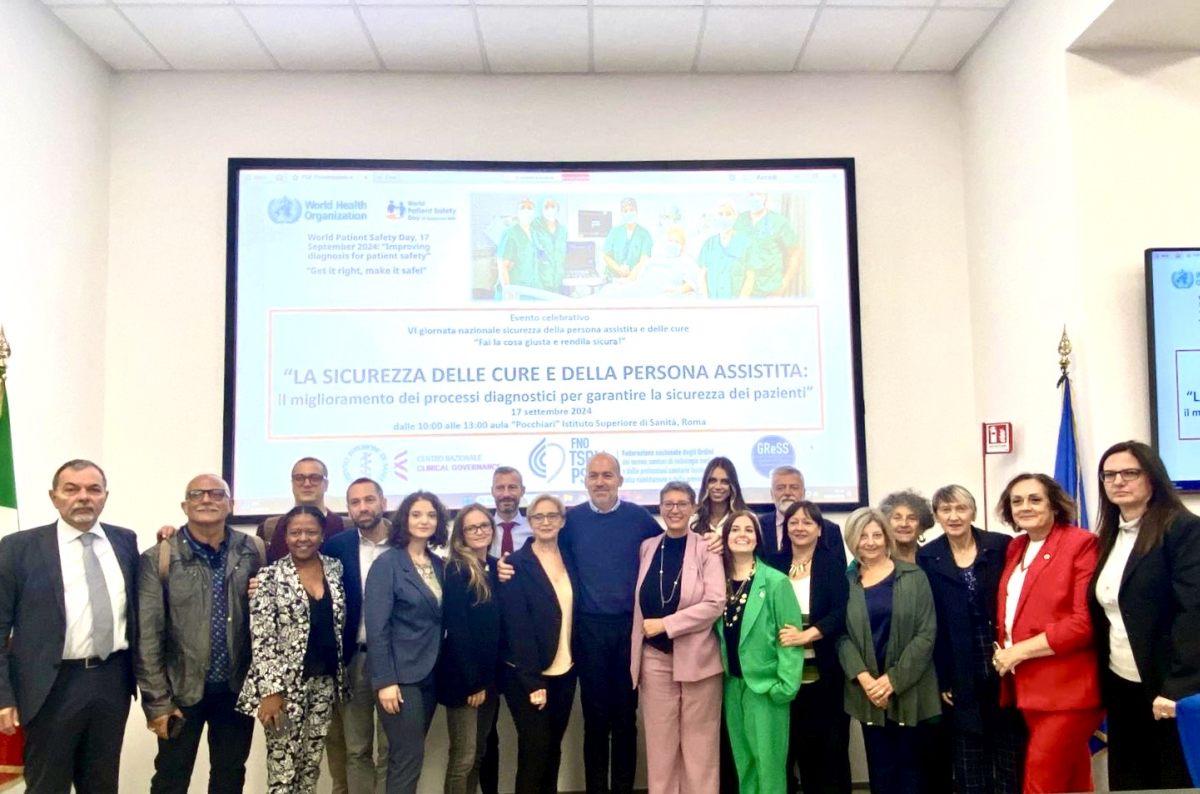ROME (ITALPRESS) – Engaging health care, social and health care professionals, and citizens’ associations to raise awareness of the relevance of strategies for the safety of care and the person being cared for, recognizing the organizational aspects of care delivery as the basis of a safe care pathway: is the focus of the meeting organized in Rome by the Federation of the Orders of Medical Radiology Health Technicians and Rehabilitation and Prevention Technical Health Professions (FNO TSRM and PSTRP), in collaboration with the National Clinical Governance Center of the ISS, on the occasion of the 6th National Day of Safety of the Person Cared for and Care.”Safety of the assisted person and care is a priority for global health, is a central issue for all health professionals and involves all areas: prevention, diagnosis, treatment, rehabilitation and care. “Do no harm” is the most important principle for any health service. However, statistical data and literature show that the burden of preventable harm to those being cared for is enormous. We need to work so that most of the errors that cause harm that do not result from the practices of a single health professional or a group of them, but rather from failures in the system or processes that lead those professionals to make mistakes, can be prevented for the sake of overall health. Working in this direction will certainly help to restore trust between health professionals and citizens and vice versa, especially at a time such as we are currently experiencing, when assaults on health personnel are becoming increasingly common. Today’s day is an important opportunity to reflect jointly; for this reason, the interdisciplinary focus involving the National Federations and Councils of the health and social care professions, as well as representatives of citizens and health care institutions, takes on special value. Our national federation represents 18 of the 30 health professions, with about 160 thousand colleagues, and we are convinced that each of them contributes with their specific skills to overall safety, the centrality of the assisted person and the reduction of avoidable (predictable and preventable) errors,” said Teresa Calandra, president of the FNO TSRM and PSTRP. Calandra also expressed satisfaction with ISS’s commitment to involve all national Federations and Councils of the health and social health professions on issues pertaining to guidelines and good practices in health care.ISS Director Rocco Bellantone, in his greeting message, emphasized that “the safety of the assisted person is a fundamental pillar of the quality of care and is an inalienable right of every person. In a rapidly changing world with increasingly complex healthcare systems, it is our duty to ensure that safety remains at the center of all our actions and decisions. With this in mind, our Institute plays a key role in promoting and coordinating initiatives to improve the safety and quality of care throughout the nation’s health care system. Today, more than ever, we recognize the importance of a holistic approach to safe care. It is not just about avoiding medical errors, but about creating an environment in which patients, health care providers and facilities work in synergy to achieve the best possible outcomes, promoting this culture of safety at all levels of the health care system. “One of the focal points of the day, whose reports were curated by the FNO TSRM and PSTRP Group on Risk and Safety in Health Care (GReSS), coordinated by Matteo Migliorini, was the topic of diagnostic errors, which account for about 16 percent of preventable harm in health care. A diagnostic error can have devastating consequences for patients, such as incorrect or delayed treatments, which increase clinical risks and undermine trust in the health care system. To reduce these errors, action is needed on multiple levels: constant monitoring of diagnostic equipment, technology upgrades and adoption of new technologies, and the use of artificial intelligence (AI) play a key role. AI enables professionals to improve the accuracy of diagnoses, reducing examination time and optimizing resources; it never replaces technical judgment, but provides support to improve clinical decisions and reduce cognitive errors. With this in mind, functional assessment, used in the field of rehabilitation, also supports safer diagnosis. Proper functional assessment reduces the risk of errors and improves the overall safety of the care pathway. Another key aspect is the importance of effective communication: adopting clear and transparent communication provides a better understanding of diagnostic and therapeutic pathways, fostering greater participation and trust in the care received. Finally, investing in continuing education to develop soft skills, stress management, and teamwork is essential to improve safety in the health care system. Velia Bruno, director of the National Clinical Governance Center (ISS), and Matteo Migliorini, of the GReSS group of the FNO TSRM and PSTRP, moderated the event. Speakers during the day included Roberta Massa, delegate for the Central Committee of the FNO TSRM and PSTRP, Maria Grazia Laganà of the Ministry of Health, Danilo Aragno, National Federation of Chemists and Physicists, Rita Petrina, Federsanità ANCI, Luigi D’Ambrosio Lettieri, National Federation of Italian Pharmacists Orders, Valeria Fava, Cittadinanzattiva, Loredana Gigli, National Federation of Physiotherapists Orders, Gaetana Ferri, National Federation of Italian Veterinary Orders, Roberto Monaco, National Federation of Orders of Surgeons and Dentists, Mirella Silvani, National Council of Social Workers, Barbara Summo, National Council of Order of Psychologists, Silvia Vaccari, National Federation of Orders of the Midwifery Profession, and Maurizio Zega, National Federation of Orders of Nursing Professions.
– FNO TSRM and PSTRP press office photo –
(ITALPRESS).

